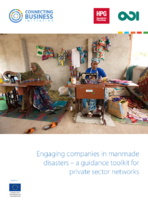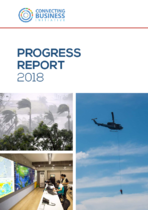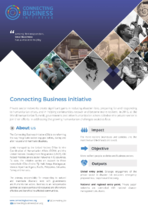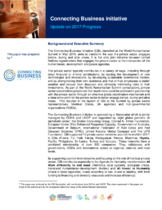This site is inactive as of February 2020. For updated information on an initiative's work, please refer to their own website as listed in their contact details.
Summary
With the scale of humanitarian need fast outpacing the ability of traditional actors to respond, it is more important than ever to engage the private sector in addressing crises. The potential for the business sector to collaborate with the international community is vast and while businesses are already making significant contributions, there are still many opportunities to expand the impact.
The Connecting Business initiative (CBi) is a multi-stakeholder initiative that provides a mechanism for the private sector to engage with the United Nations system, national governments and civil society in a coordinated manner on disaster risk reduction, emergency preparedness, response and recovery.
The initiative coordinates and facilitates access to tools, resources and mechanisms that enable businesses to strategically engage before, during and after crises. CBi supports 13 private sector networks around the world: in Côte d’Ivoire, Fiji, Haiti, Kenya, Madagascar, Mexico, Nigeria, Pacific, Philippines, Sri Lanka, Turkey and Vanuatu and continues to expand. Together these networks represent more than 1,500 companies and reach over 40,000 SMEs. The networks collaborate with governments, NGOs and international actors at regional, national and local levels. By working together with the private sector and supporting these networks, CBi aims to strengthen strategic engagement of the private sector in disaster risk reduction, emergency preparedness, response and recovery at societal, sectoral and company level, and connect the them with national, regional and international coordination structures.
Partners
The Connecting Business initiative is operated by a Secretariat which is jointly managed by OCHA and UNDP and in 2019 is supported by global partners (in alphabetic order): Australia Department of Foreign Affairs and Trade, Boston Consulting Group, Conrad N. Hilton Foundation, European Union (EU) Enhanced Response Capacity, International Federation of Red Cross and Red Crescent Societies (IFRC), United Nations Global Compact, United States Agency for International Development Office of U.S Foreign Disaster Assistance and The UPS Foundation.

Goals
CBi provides a global entry point for the private sector to learn how they can contribute to humanitarian response and help communities become more resilient to disasters (natural and manmade); thus, to save lives and livelihoods. CBi brings together global companies and private sector networks at national and regional levels to learn from one another and explore potential tools and solutions to adapt in their respective context. Finally, CBi provides hands-on support to connecting these networks to national and international disaster management structures.
At national and regional levels, CBi networks:
- Coordinate business engagement with governments, NGOs, UN organizations and others before, during and after crises.
- Strengthen the resilience of businesses to withstand and recover from emergencies through business continuity training.
- Strengthen private sector coordination with local, national and international disaster management structures and processes, as well as resilience programs operated by the governments, UN, NGOs and others.
- Match private sector capacities and resources to needs before, during and after emergencies, and facilitate pre-positioning agreements.
- Act as a local entry point for private sector response to emergencies, supporting UN and government mechanisms.
- Advocate for private sector engagement and inspire further action.
- Catalyze innovative partnerships between the public and private sector.
Resources










 summary
summary partners
partners goals
goals Stakeholder reports
Stakeholder reports resources
resources contacts
contacts
